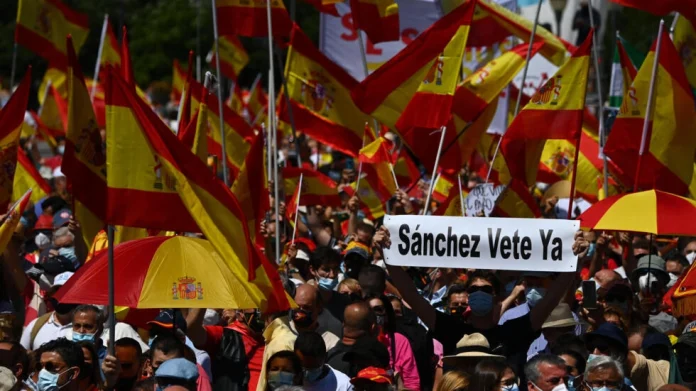People poured onto the streets of Barcelona on Sunday denouncing what they said was a “coup” being prepared by the Spanish government to pardon those involved in the 2017 attempted secession of Catalonia, EURACTIV reported.
Left-wing Sumar platform announced plans to submit a proposal to include an emergency pardon measure in the Spanish Constitution on Tuesday.
Spanish demonstrators, including members of the main opposition Partido Popular (PP/EPP) and the far-right VOX party, expressed strong opposition to Madrid’s amnesty law.
People chant, “Not in my name: neither amnesty nor self-determination” and “Puidgemont to prison.”
Carles Puigdemont is a Catalan separatist leader who has been in hiding from Spanish courts since 2017 for his direct responsibility for the Catalan campaign.
An amnesty law and a referendum on Catalonia’s self-determination are the two main demands put forward by separatist parties in support of the reappointment of incumbent Prime Minister Pedro Sánchez.
Demonstrators organised by the Civic Catalan Society (SCC) urged Sánchez not to give in to the demands of the centre-right separatist Junts Per Catalunya (JxCat) party, led by Puigdemont, and the Esquerra Republicana de Catalunya (Republican Left of Catalonia, ERC).
PP leader Alberto Núñez Feijóo, with whom Sánchez is meeting on Monday, VOX leader Santiago Abascal and Madrid region president Isabel Díaz Ayuso (PP) also took part in the protest.
Isabel Díaz Ayuso:
“It is not an amnesty that seeks reconciliation, what it seeks is the presidency of the government. It does not seek coexistence; it seeks an economic transaction in exchange for the presidency of the government for seven votes [of the JxCat MPs]. This is logically an involution and a reactionary decision.”
Abascal said returning “to Barcelona to support all the suffering Catalans and Spaniards who are concerned about what is happening” was a very important step on Sunday.
However, despite the protests, political circles in Madrid and Barcelona suggest that the government will pass an amnesty law probably by the end of November or before the end of the year.
Last week, Sánchez recognised that “generosity” was needed to restore relations with Catalonia, but ruled out the hypothesis of a referendum, suggesting that an amnesty should be considered instead.
Yolanda Díaz, leader of Sumar and potential vice-presidential candidate in Sánchez’s probable future government, announced that her party would present on Tuesday an amnesty law drafted by a group of experts and suitable for the Spanish Constitution.
According to the draft, Sumar proposes to decriminalise since 2013 all those charged or convicted for actions related to achieving “self-determination of Catalonia.” Such a measure could benefit around 5,000 people, Spanish media speculated.
Sumar wants to pass an amnesty law or a very similar legal formula that will not later be challenged in the Constitutional Court by the PP and VOX.
The more complex it is, and the more articles it has, the more chances it will have of being taken to the Constitutional Court.
On November 9, 2014, an illegal referendum on secession was held in Catalonia. At that time, the questions asked were: “Do you want Catalonia to be a state? If yes, do you want this state to be independent?”
According to the regional government, 80.76 per cent of voters supported Catalonia’s independence. However, the latest polls show a very different picture: currently only 42% of Catalans would support the hypothetical independence of the region.
However, if Spain’s left wing approves the amnesty, Catalan separatists will be able to make a new bid in a few years.
